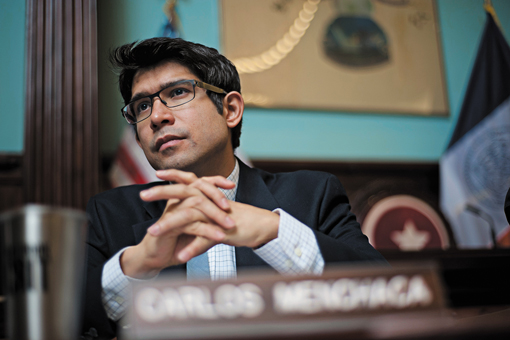One year later, the 34-year-old openly gay native of El Paso, Texas, is putting his ideas into action as the first Mexican-American elected to the New York City Council. Menchaca’s seemingly overnight transition from LGBT and HIV/AIDs liaison for Christine Quinn to council member came as a shock to many in the New York political machine. But not to the residents of Red Hook, Sunset Park and the other South Brooklyn neighborhoods that elected him. In a district that is 49.6 percent foreign-born and where nearly half the residents earn $35,000 a year or less, community members see Menchaca as one of them. The son of Mexican immigrants, he spent his childhood in public housing, lived on food stamps and, like many of his constituents, didn’t speak English for the first years of his life.
But most importantly, it was Menchaca’s hands-on presence and promise of bringing decision-making authority to his community that accounted for his political success. As he relayed the needs of hurricane-stricken Brooklyn neighborhoods to the relevant agencies, community members began to view him as a trusted ally who was championing their cause while the rest of the government ignored them. During his campaign, Menchaca’s strongest supporters were undocumented immigrant mothers—many of whom encouraged their citizen children to register to vote. The community-driven campaign raised $40,000 in two weeks, with an average individual donation of $100.
Menchaca’s goal of giving residents more political power has been the hallmark of his short time in office. He has joined nine veteran council members as the only freshman council member to launch participatory budgeting in his district, allocating $2 million from his discretionary funds for community-
selected projects. Following several neighborhood assemblies to discuss project proposals, nearly 3,000 residents voted in April 2014 on how to spend the money—more than in any other district with participatory budgeting. In what was the first time many residents had voted, they decided to dedicate more than half the funds to public school improvement projects.
In June 2014, Menchaca co-sponsored legislation introducing a municipal ID for all New Yorkers, regardless of immigration status. Signed into law by New York City Mayor Bill de Blasio in July, the program will be the largest of its kind in the country, offering immigrants access to critical city services that require some form of identification.
Menchaca wants to engage his district in less traditional ways as well. Influenced by his dual bachelor’s degree in politics and performing arts and social justice from the University of San Francisco, he hopes to involve community members in the Theatre of the Oppressed, which uses interactive theater to promote discussion between actors and the audience about social and political change. Through its annual Legislative Theatre Festival in New York, the theater engages people typically excluded from the political process—including immigrants, the homeless and prisoners—in acting out challenges they face for an audience that includes local legislators. Menchaca attended this year and wants to bring the model to District 38 so that his constituents can “legislate through theater” as well.
For Menchaca, this is only the beginning of engaging his constituents in the work of government. “It’s their government now,” he says.






